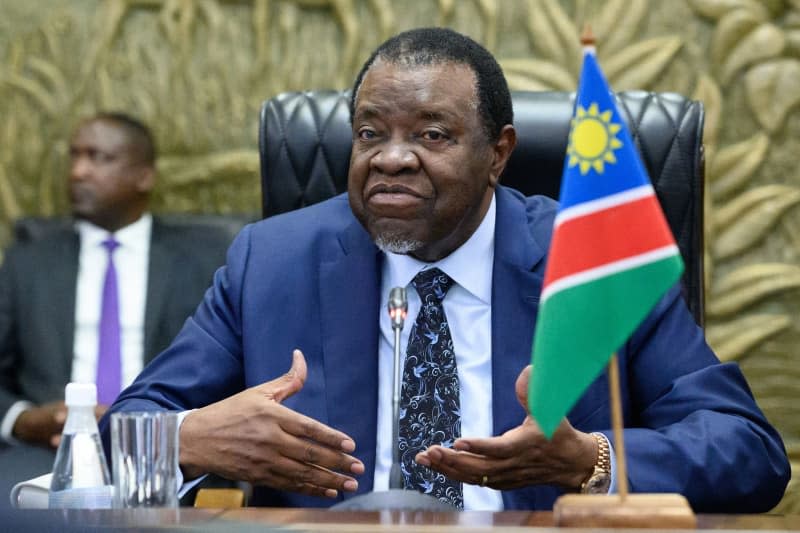Namibian President Hage Geingob dies aged 82

- Oops!Something went wrong.Please try again later.
- Oops!Something went wrong.Please try again later.
Hage Geingob, the president of Namibia, has died in hospital in Windhoek in the early hours of Sunday morning, his deputy announced.
"The Namibian nation has lost a distinguished servant of the people, a liberation struggle icon, the chief architect of our constitution and the pillar of the Namibian house," acting president Nangolo Mbumba said in a statement on social media.
Geingob, aged 82, was being treated at the private Lady Pohamba hospital in Namibia's capital Windhoek after recently revealing that his medical team had discovered cancerous cells following a biopsy.
His wife, Monica Geingob, and his children were at his side, Mbumba said.
He added that the Cabinet would convene with immediate effect to make the necessary state arrangements and further announcements would be made in this regard.
On February 1, the presidency announced that Geingob had returned from the US where he had received "a two-day novel treatment for cancerous cells."
Geingob was the country's third president and had been in office since 2015. He was one of the leading political figures in the country and played a decisive role until Namibia's independence in 1990.
Born on August 3, 1941, in the rural town of Otjiwarongo in what was then South West Africa, Geingob initially trained to be a teacher.
In the 1960s, he joined the liberation movement to free his country from foreign administration by neighbouring South Africa, which at the time was run by the apartheid government.
Geingob became a member of the South West African People's Organisation (SWAPO), which later violently pursued its goal of independence with military support from the Soviet Union and Cuba.
Geingob initially acted as SWAPO's deputy in Botswana and became the representative to the United Nations in New York in 1964, where he simultaneously studied political science at renowned US universities.
When the UN Institute for Namibia was founded in 1975, Geingob became its director, a position he held until his return to his African homeland in 1989.
As the first prime minister of independent Namibia - under the presidency of Sam Nujoma - Geingob campaigned for reconciliation and the reconstruction of the former German colony (1884 - 1915) with a population of 2.6 million.
Geingob was regarded as a brilliant thinker and accomplished rhetorician who championed the rights of the oppressed.
His vision of a united and economically strong Namibia made him a respected head of state, both within the country and internationally, especially during his first term.
One of Geingob's most important political successes was the establishment of a public service in Namibia.
Nature conservation and eco-tourism were also high on Geingob's political agenda.
However, during his second term in office, for which he only narrowly won the majority of votes, Geingob lost public support.
His inability to put a stop to government mismanagement and halt high unemployment led to a sharp decline in trust.
His lavish lifestyle, his inability to accept criticism and his increasing political cooperation with China also caused resentment among the population.
In 2021, Geingob was confronted with serious allegations of corruption, however, the results of the investigation are still pending.

